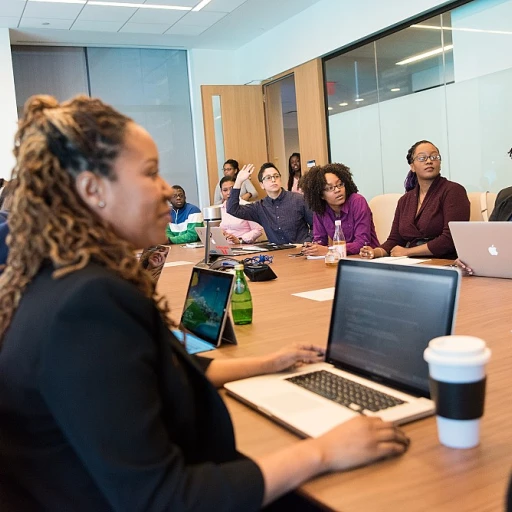
The evolving role of a chief human resources officer
The Changing Landscape of HR Leadership
In the ever-evolving business world, the role of a Chief Human Resources Officer (CHRO) has become increasingly dynamic and critical. As companies position themselves for growth and digital transformation, the expectations placed on CHROs extend beyond traditional HR functions. They are now integral to shaping and executing an organization's strategy, particularly in aligning human capital with business objectives.
Strategic Partner and Business Catalyst
Today's CHROs are emerging as strategic partners within their companies, a shift driven by the need to synchronize human resources with broader business strategies. Their role involves collaborating closely with other executives and consulting firms to ensure that HR initiatives support the company’s strategic goals. From digital transformation initiatives to integrating artificial intelligence and data analytics, CHROs are at the forefront of modernizing HR practices.
By leveraging essential components of a B2B go-to-market strategy, CHROs can effectively align HR functions with the organization’s marketing and growth efforts, ensuring a cohesive approach to talent management and consumer engagement.
Navigating the Intersections of Technology and People
As the digital landscape increasingly influences operational frameworks, CHROs must understand the implications of integrating new technologies. This demands an in-depth view of how digital tools, such as big data and artificial intelligence, can optimize HR services. A strategic approach ensures that technology enhances, rather than disrupts, the employee experience while delivering value to clients and stakeholders.
The ability to manage these intersections is further complicated by the ongoing demand for agile risk management and supply chain resilience, as seen in management consulting and strategy consulting firms. With insights drawn from top consultancy orgs and consulting firms, CHROs are better equipped to identify risks and implement effective mitigation strategies.
Key skills and competencies for a successful CHRO
Essential Skills for Modern HR Leadership
The role of a Chief Human Resources Officer (CHRO) has evolved significantly, requiring a diverse set of skills and competencies. In the context of strategy consulting and digital transformation, CHROs must be equipped to navigate complex business landscapes. Here are some key skills that define a successful CHRO:
- Strategic Thinking: A CHRO must align HR strategies with the overall business objectives. This involves understanding the company profile and how HR initiatives can drive growth and enhance company performance.
- Data-Driven Decision Making: In today's digital age, leveraging data analytics is crucial. CHROs need to harness big data and workforce intelligence to make informed decisions that impact the firm's bottom line. For more insights, explore how harnessing workforce intelligence can enhance strategic HR leadership.
- Change Management: As companies undergo digital transformation, CHROs play a pivotal role in managing change. This involves guiding employees through transitions and ensuring that the firm's culture adapts to new technologies and processes.
- Technology Acumen: Understanding and implementing HR technology solutions is vital. CHROs must stay updated with the latest in artificial intelligence and digital tools to streamline HR processes and improve employee experience.
- Leadership and Communication: Strong leadership skills are essential for motivating teams and fostering a collaborative environment. Effective communication ensures that the HR vision is clearly articulated across the organization.
- Risk Management: Identifying and mitigating risks related to human capital is a critical function. This includes understanding compliance issues and ensuring that the company adheres to legal and ethical standards.
These competencies are integral to the CHRO's role in consulting firms and other business sectors, including consumer goods, life sciences, and the public sector. As the business environment continues to evolve, CHROs must adapt and innovate to remain at the forefront of HR leadership.
Challenges faced by CHROs in the modern workplace
Overcoming Modern Workforce Challenges
The role of a Chief Human Resources Officer (CHRO) in today’s dynamic and digital environment is constantly evolving. CHROs are increasingly expected to play a strategic role in shaping company culture and aligning human resources with business goals, all the while tackling significant challenges that arise from transforming workplaces.
CHROs are at the forefront of addressing the complexities posed by digital transformation, requiring a deep understanding of technology’s impact on human resources. Often, CHROs collaborate closely with IT and other departments to integrate community reinforcement strategies that build resilience among employees adapting to these changes.
- Data-Driven Decision Making: The proliferation of big data and data analytics has empowered CHROs to make informed decisions. However, handling and interpreting vast amounts of data remains a significant hurdle. Leveraging data analytics in shaping HR strategies demands expertise and resources to ensure data coherently informs management decisions.
- Employee Engagement and Retention: Another critical challenge is fostering employee engagement amid widespread digital adoption. Engaging a remote or hybrid workforce requires innovative approaches to maintain motivation and connectivity, posing challenges for traditional HR practices.
- Adapting to Technological Advancements: The fast pace of innovation means staying ahead of emerging technologies like artificial intelligence and understanding their implications on talent management is imperative for any consulting firm’s HR leader. CHROs are tasked with ensuring the workforce is prepared for these shifts, which often means activating company initiatives for continuous learning and development.
Amid these challenges, CHROs have the unique opportunity to drive significant change within their organizations. They must balance strategic consultancy roles with addressing immediate HR needs to ensure organizational growth and sustainability in the united states and globally. Successfully navigating these challenges places CHROs in a crucial position within management consulting and aligns their efforts with broader business strategy objectives.
The impact of IT strategy on human resources
IT Strategy's Influence on Human Resources Management
In the realm of human resources, the influence of IT strategy has grown immensely, integrating essential technology-driven elements into HR functions. The incorporation of digital transformation has reshaped how businesses view their human capital, directly affecting the role and responsibilities of a Chief Human Resources Officer (CHRO).
Consulting firms have increasingly acknowledged HR as a pivotal player in company growth, aligning IT with strategic business objectives. This alignment aids companies in enhancing their profiles through comprehensive data analytics and effective deployment of big data solutions. The pivotal interplay between HR and IT equips CHROs with the tools necessary to foster innovation and optimize performance within the organization.
Several aspects shape this intersection of IT and HR:
- Data-Driven Decisions: CHROs now leverage big data to make informed decisions regarding talent management and workforce planning. This, in turn, facilitates a more strategic approach to risk management and employee engagement.
- Artificial Intelligence: AI applications in HR streamline recruitment processes, enhance skill matching, and personalize employee experiences. Consultancy orgs focus on integrating AI to boost efficiency and precision in managing consumer goods and public sector enterprises, among others.
- Digital Transformation: Transitioning to digital channels enables a more agile HR function, fostering innovation within the consultancy and strategy consulting domains. It supports the adaptation to evolving business needs and the dynamic supply chain landscape.
- Cloud Services: The shift towards cloud technology ensures that HR functions remain flexible and scalable, supporting the diverse needs of a global workforce. Technology firms offer management consulting services to guide companies through this transformative journey.
As technology advances, the synergy between IT and HR becomes an indispensable asset for businesses aiming to maintain a competitive edge. By expanding their consulting expertise, CHROs can guide firms in creating future-ready HR strategies that align with the firm's overarching objectives.













